Hong Kong leader’s policy address marked by chaos as rowdy lawmakers protest
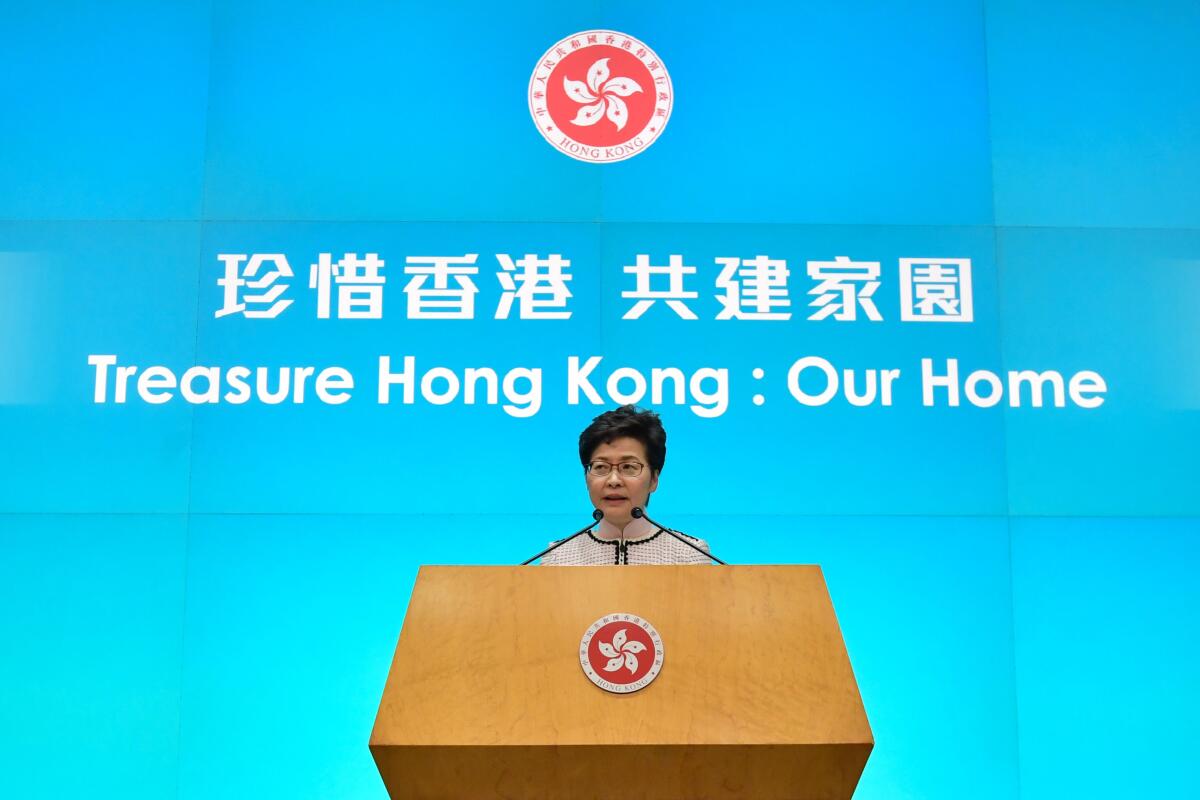
- Share via
BEIJING — Hong Kong Chief Executive Carrie Lam stood at the front of the Legislative Council, lips pursed in disgruntled silence as the sound of screaming protesters clashing with police filled the chamber.
Pro-democratic lawmakers were protesting her policy address, an annual speech similar to the State of the Union where the special administrative region’s leader outlines policy initiatives for the coming year.
Lam tried twice to give her speech on Wednesday morning but was blocked by protesting lawmakers demanding her resignation.
They blasted a recording of protesters fighting with police, drowning out her voice. One legislator projected the words “Five demands, not one less,” in giant black-and-white text on her face and the wall behind her.
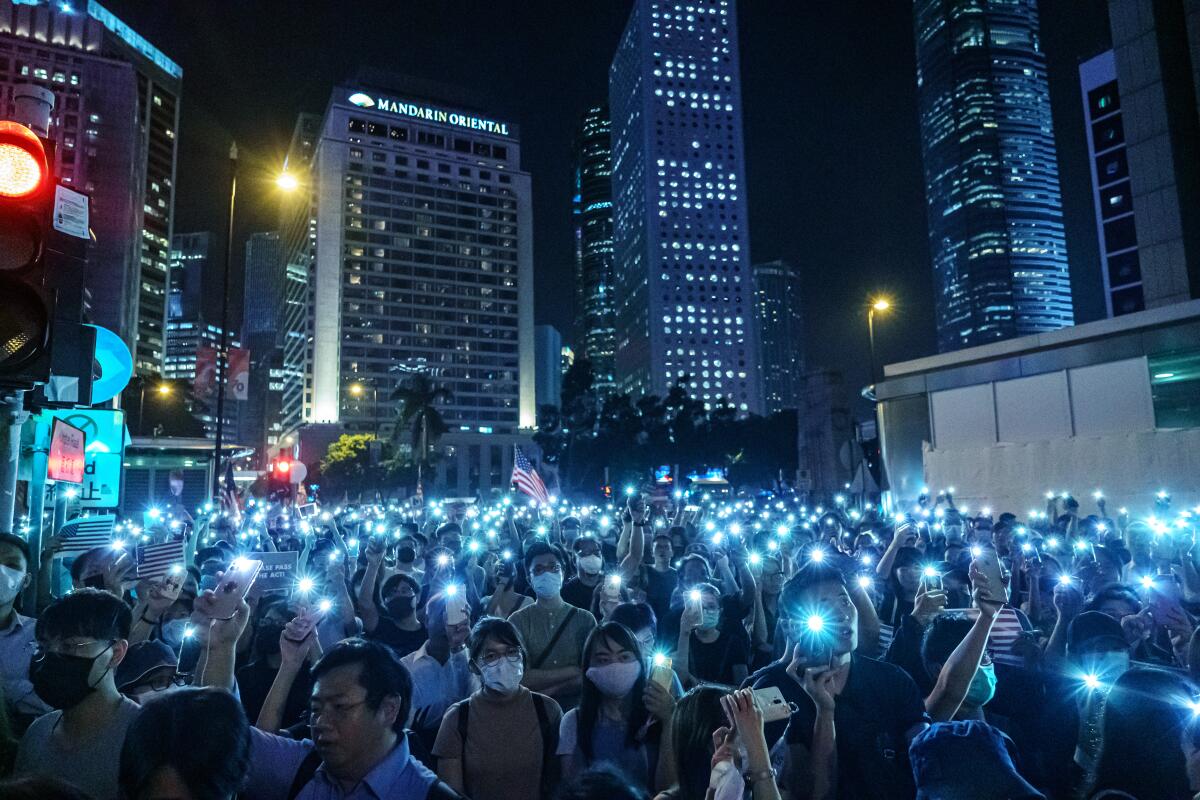
Another clambered onto a table, raising a picture depicting Lam with bloodied hands and chanting the same slogan, a reference to the demands for police accountability and government reform that have animated more than four months of mass protests.
Several wore masks of Chinese President Xi Jinping, taunting a recent mask ban invoked under emergency law that has sparked fears of excessive executive power in the name of controlling political unrest.
In mainland China, state TV channels abruptly cut live broadcasts of the speech and switched to soothing footage of green mountains in rural China.
The breakdown of order within the legislature mirrored current chaos in Hong Kong society. The Beijing-backed government’s use of blunt force to respond to months of political protests has spurred radicalization of protesters and widespread fear among regular citizens who have lost trust in Lam’s administration and the police.
Protesters have turned to the U.S. Congress for help, rallying for a bill supporting their cause that passed in the House on Tuesday, enraging Beijing authorities who see Hong Kong’s quagmire as a domestic issue that brooks no outside interference. The central government has doubled down on support for Lam, though her popularity is at an all-time low — and Wednesday’s speech didn’t seem to help.
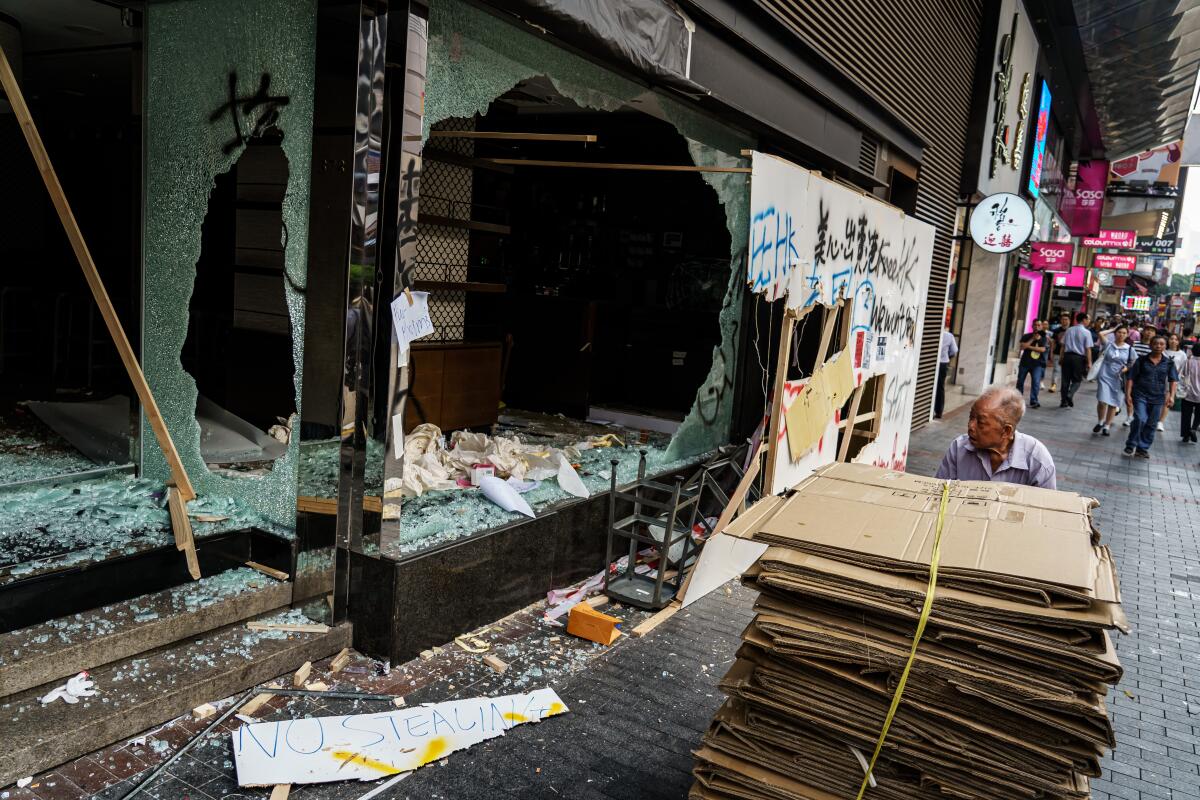
The legislature’s president, Andrew Leung, ordered several lawmakers to leave the chamber, reprimanding the room like an angry father while others continued to chant and shout. Lam was forced to leave. One person threw a placard at her back as security guards ushered her out.
An hour later, local TV broadcast a prerecorded video of Lam’s prepared speech. A bright red Chinese flag and a Hong Kong flag hung in the background as Lam delivered the shortest policy address since Hong Kong’s handover to Chinese rule in 1997, and the only one ever to be given by video.
“It looks like either an Al Qaeda address or a government in exile which cannot deliver its policy in parliament,” said pro-democratic lawmaker Au Nok-hin. Au was arrested and charged with “assaulting police with a loudspeaker” during a protest in the summer, reportedly because the loudspeaker was too loud and hurt officers’ ears.
Many pro-democratic lawmakers have joined Hong Kong’s protests, which have evolved from demanding withdrawal of an extradition bill — which would have allowed deportation of suspected criminals to China — into a broader movement against police brutality and a demand for reform to allow citizens to choose their own representatives.
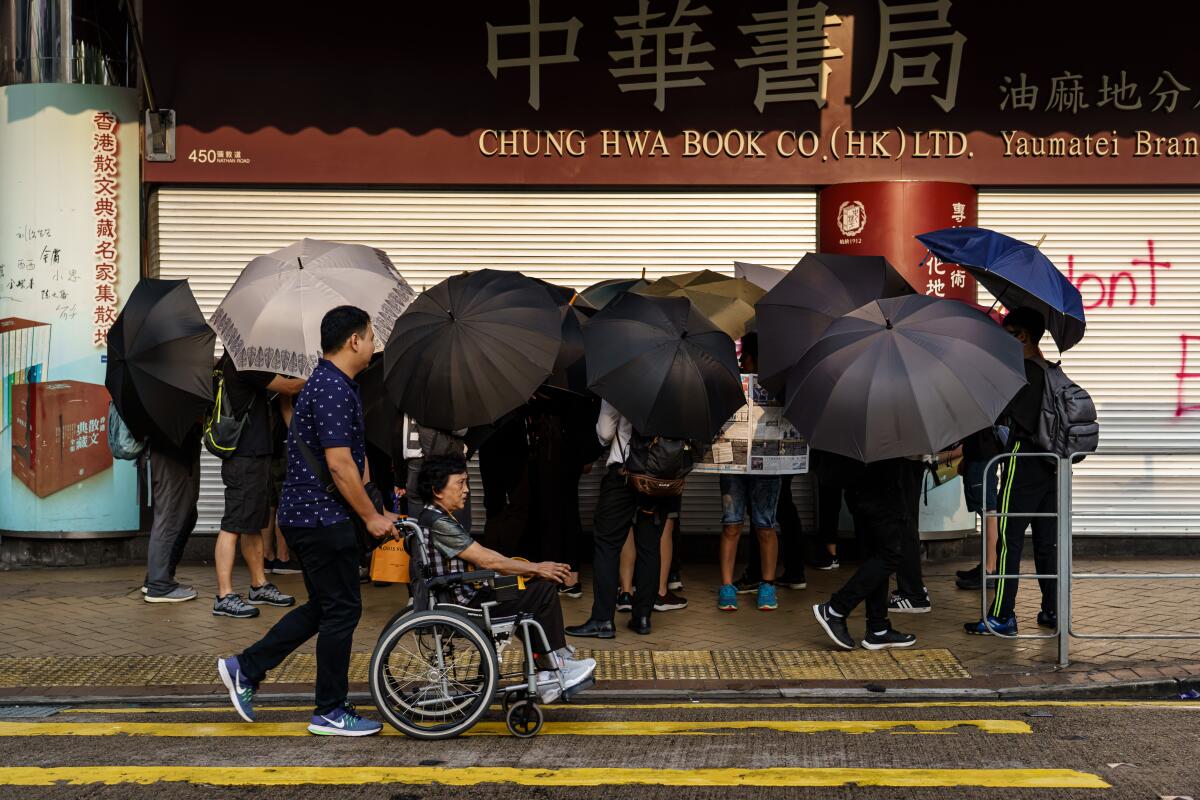
Hong Kong’s current electoral system allows direct voting for half its representatives; the other half are chosen by “functional constituencies,” limited electorates that represent different interest groups and typically tilt toward business interests and Beijing. The chief executive is chosen by a select committee of 1,200 members also widely seen as pro-Beijing elites.
When Lam finally spoke, she announced 200 new initiatives including aggressive measures to claim land from private developers, build 10,000 new homes in three years, provide subsidies to students and low-income households, and thus ease the economic challenges that she said were at the root of recent unrest.
“Hong Kong will soon be able to emerge from the storm and embrace the rainbow,” Lam said.
She did not address protesters’ demands for political change but promised to hold a live Facebook Q&A on Thursday evening.
Eric Lai, vice convener of the Civil Human Rights Front, a coalition that has organized peaceful marches bringing millions into the streets over the summer, said Lam’s economic initiatives failed to address the Hong Kong protests’ root cause.
“All the social and economic inequality is caused by imbalance and unequal relations between the government and people,” he said, adding that mass distrust of the police due to excessive use of force is also a core problem that Lam did not address.
“You cannot feed us and beat us at the same time and ask us to feel hopeful for the future of Hong Kong,” he said.
A new poll conducted by the Chinese University of Hong Kong and published Wednesday showed that nearly 70% of respondents supported “large scale restructuring of the police force.” Nearly 50% indicated zero trust in the current Hong Kong government, while 44.7% indicated zero trust in the Beijing government.
The Civil Human Rights Front has called for another protest march on Sunday, which is still awaiting police approval.
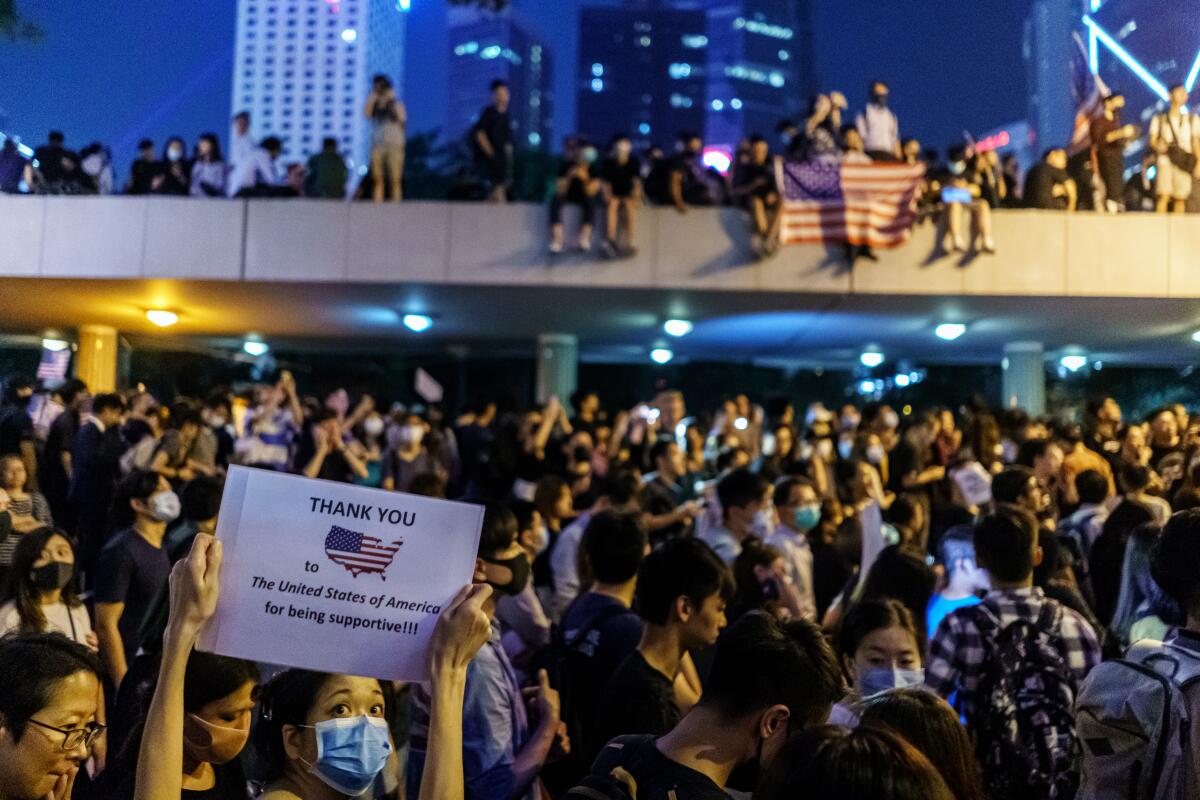
Although the mask ban successfully reduced the size of some recent protests, tens of thousands waved U.S. flags at an authorized rally Monday night for the Hong Kong Human Rights and Democracy Act, a U.S. bill that would penalize Chinese and Hong Kong officials for harming democratic freedoms in the region.
It would also require Congress and the State Department to check annually whether Hong Kong is “sufficiently autonomous” from mainland China to justify special trade status with the U.S.
The House of Representatives passed the act on Tuesday, along with another bill blocking Hong Kong police from using U.S. weapons on protesters, and a resolution affirming Hong Kong’s bilateral relationship with the U.S. and condemning China’s “interference” in Hong Kong affairs.
“If America does not speak out for human rights in China because of commercial interests, then we lose all moral authority to speak out on behalf of human rights anyplace in the world,” said House Speaker Nancy Pelosi. The bill will go to the Senate next, where it has bipartisan sponsorship and is expected to pass.
“What does it profit a person if he gains the whole world but loses his soul?” Pelosi said.
Officials in Beijing were infuriated. Foreign Ministry spokesman Geng Shuang issued a statement Wednesday calling the act a move of “shocking hypocrisy” from U.S. lawmakers with “malicious intention to undermine Hong Kong’s prosperity and stability to contain China’s development.”
“The current situation in Hong Kong has nothing to do with human rights or democracy. The real issue is to promptly end violence, restore order and safeguard the rule of law,” Geng said, pointing to protesters’ use of arson, vandalism and violence against police officers as evidence.
He said China would take unspecified “strong countermeasures” to the act and warned the U.S. to “stop meddling in Hong Kong affairs and China’s internal affairs before falling off the edge of the cliff.”
More to Read
Sign up for Essential California
The most important California stories and recommendations in your inbox every morning.
You may occasionally receive promotional content from the Los Angeles Times.














